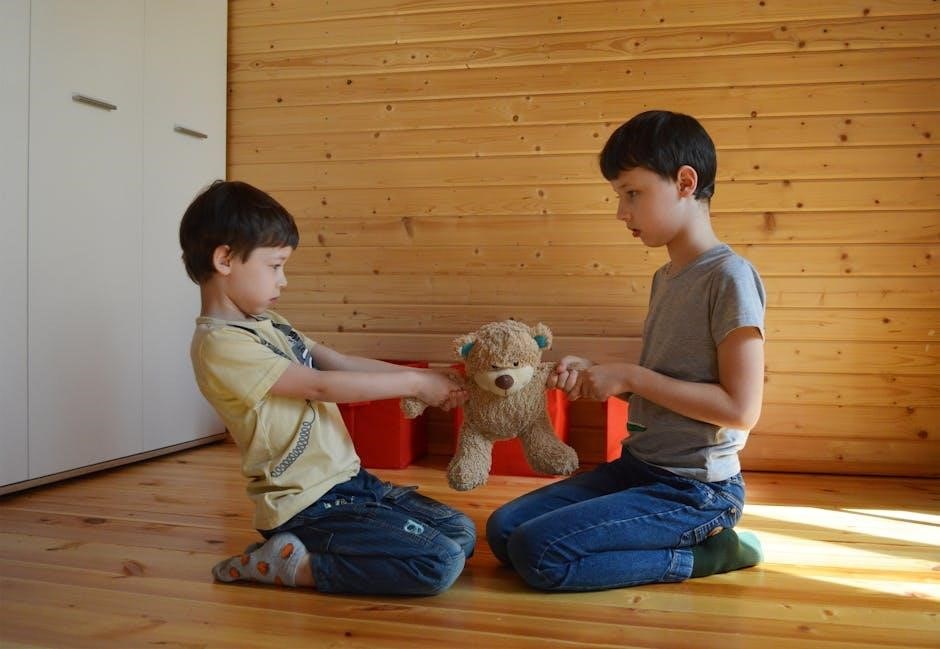Developmental psychology studies human growth and changes across the lifespan‚ focusing on physical‚ cognitive‚ social‚ and emotional development․ It explores how individuals adapt and remain consistent from conception to old age․
1․1 Definition and Scope
Developmental psychology is the scientific study of human development across the lifespan‚ focusing on physical‚ cognitive‚ social‚ and emotional changes․ It examines how individuals grow‚ adapt‚ and remain consistent from conception to old age․ The field explores biological‚ psychological‚ and socio-cultural factors influencing behavior and development․ Key areas include cognitive development‚ such as thinking and problem-solving; social development‚ involving relationships and interactions; and emotional development‚ covering feelings and self-regulation․ Developmental psychology also addresses developmental delays and disorders‚ aiming to understand and support optimal growth․ By studying these aspects‚ it provides insights into human development‚ guiding practices in education‚ parenting‚ and mental health․ Its scope is interdisciplinary‚ integrating theories and methods from psychology‚ biology‚ sociology‚ and education to comprehensively understand human growth and development․
1․2 Importance of Studying Developmental Psychology
Studying developmental psychology is crucial for understanding human growth and behavior across the lifespan․ It provides insights into physical‚ cognitive‚ social‚ and emotional development‚ enabling professionals to address developmental challenges effectively․ By understanding developmental stages‚ educators can design age-appropriate curricula‚ while parents and caregivers can adopt supportive rearing practices․ Developmental psychology also informs policies aimed at promoting healthy development and addressing disabilities․ It equips researchers and practitioners with tools to improve mental health interventions‚ education‚ and social services․ Additionally‚ it fosters empathy and understanding of diverse developmental experiences‚ enriching societal attitudes toward growth and aging․ Ultimately‚ its study enhances overall well-being by addressing the complex needs of individuals at every life stage‚ ensuring optimal development and adaptability in an ever-changing world․

Key Theories in Developmental Psychology
Developmental psychology encompasses various theories explaining human growth․ Key theories include cognitive development‚ focusing on mental processes; social development‚ emphasizing interactions; and emotional development‚ addressing feelings․ Theorists like Piaget‚ Vygotsky‚ Bowlby‚ and Erikson provide foundational frameworks․
2․1 Cognitive Development Theories
Cognitive development theories explain how individuals acquire and process information throughout their lives․ Jean Piaget’s theory proposes four stages of cognitive development‚ emphasizing active learning and schemata․ Lev Vygotsky’s sociocultural theory highlights the role of social interactions and language in shaping cognitive abilities․ Both theories suggest that cognitive growth is a gradual‚ structured process influenced by internal and external factors․ These frameworks provide insights into understanding learning‚ problem-solving‚ and memory development across different age groups․ By exploring these theories‚ developmental psychologists can better understand how cognitive processes evolve and adapt over time․
2․2 Social Development Theories
Social development theories focus on how individuals develop interpersonal skills and understand social norms․ Bowlby’s attachment theory emphasizes early caregiver relationships as foundational for future social behavior․ Ainsworth expanded this with attachment styles like secure and insecure․ Erikson’s psychosocial stages‚ such as trust vs․ mistrust in infancy‚ highlight social growth across the lifespan․ Bandura’s social learning theory suggests observation and imitation shape social behaviors‚ as seen in his Bobo doll experiments․ These theories collectively explain how social interactions‚ caregiver influence‚ and cultural contexts contribute to developing empathy‚ cooperation‚ and identity․ Understanding these theories aids in fostering healthy social development and addressing challenges in interpersonal relationships․
2․3 Emotional Development Theories
Emotional development theories explore how individuals experience and manage emotions from infancy to adulthood․ Freud’s psychoanalytic theory suggests emotions stem from unconscious conflicts‚ while Erikson’s psychosocial stages link emotional growth to social interactions․ Maslow’s hierarchy of needs posits that emotional well-being depends on fulfilling basic needs․ Additionally‚ attachment theory‚ developed by Bowlby and Ainsworth‚ highlights the role of early caregiver relationships in shaping emotional regulation․ These theories collectively emphasize the interplay of biological and environmental factors in emotional development‚ providing insights into how individuals develop emotional intelligence and resilience․ Understanding these theories aids in promoting emotional health and addressing emotional challenges across the lifespan․
Cognitive Development
Cognitive development explores how mental processes like thinking‚ memory‚ and problem-solving evolve from infancy to adulthood․ It examines how individuals construct understanding and adapt to their environment․
3․1 Piaget’s Theory of Cognitive Development
Jean Piaget’s theory proposes that cognitive development occurs in four stages: Sensorimotor‚ Preoperational‚ Concrete Operational‚ and Formal Operational․ Each stage represents a unique way of thinking and understanding the world․ The Sensorimotor stage (0-2 years) involves learning through sensory experiences and motor activities․ The Preoperational stage (2-7 years) is characterized by egocentrism and the development of language․ The Concrete Operational stage (7-11 years) introduces logical thinking about concrete events․ Finally‚ the Formal Operational stage (12+ years) involves abstract reasoning and problem-solving․ Piaget emphasized that children construct knowledge through active interaction with their environment‚ using schemas‚ assimilation‚ and accommodation to adapt to new experiences․
3․2 Vygotsky’s Sociocultural Theory
Lev Vygotsky’s sociocultural theory emphasizes the role of social interactions and culture in cognitive development․ He proposed that children learn through collaboration with more knowledgeable others (MKOs)‚ such as parents or teachers‚ within their Zone of Proximal Development (ZPD)․ The ZPD refers to the range of tasks a child can perform with guidance but not independently․ Vygotsky also stressed the importance of language as a tool for cognitive development‚ arguing that inner speech helps regulate thought and behavior․ His theory highlights how cultural practices and tools shape mental processes‚ suggesting that development is deeply embedded in social and cultural contexts․ This approach contrasts with Piaget’s focus on individual construction of knowledge‚ emphasizing instead the collaborative nature of learning and development․

Social Development
Social development explores how individuals form relationships and develop social skills․ Theories like Bowlby’s attachment and Erikson’s psychosocial stages explain how trust and identity shape social interactions and emotional bonds throughout life․
4․1 Bowlby’s Attachment Theory
John Bowlby’s attachment theory emphasizes the importance of early emotional bonds between children and caregivers․ He proposed that a secure attachment serves as a foundation for healthy social and emotional development․ Bowlby identified attachment styles—secure‚ anxious‚ avoidant‚ and disorganized—each influencing future relationships․ The theory highlights the role of sensitivity and responsiveness in caregiving‚ suggesting that consistent‚ nurturing interactions foster a secure base for exploration and growth․ Bowlby also introduced the concept of the “internal working model‚” where early attachment experiences shape expectations and behaviors in later relationships․ His work underscores the long-term implications of attachment security‚ linking it to mental health outcomes and interpersonal functioning across the lifespan․
4․2 Erikson’s Psychosocial Development Stages
Erik Erikson’s psychosocial development theory proposes eight stages‚ each representing a unique conflict that contributes to personality development․ The stages span from infancy to adulthood‚ emphasizing the role of social and cultural influences․ The first stage‚ trust vs․ mistrust‚ occurs in infancy‚ where consistent caregiving fosters trust․ Subsequent stages include autonomy vs․ shame‚ initiative vs․ guilt‚ and industry vs․ inferiority‚ each building on the previous․ Adolescence introduces identity vs․ role confusion‚ followed by intimacy vs․ isolation in young adulthood․ Middle adulthood focuses on generativity vs․ stagnation‚ and finally‚ old age addresses integrity vs․ despair․ Erikson’s theory highlights the importance of resolving these conflicts to achieve healthy development and a positive sense of self․ His work remains influential in understanding lifespan development and its societal implications․

Emotional Development
Emotional development involves understanding and managing emotions‚ crucial for mental health and relationships‚ shaped by interactions and experiences across the lifespan․
5․1 Emotional Stages and Milestones
Emotional development progresses through distinct stages‚ with milestones marking significant changes in emotional understanding and regulation․ Infancy begins with basic emotions like joy and fear‚ evolving into more complex feelings during toddler years․ Adolescence introduces emotional turmoil and identity formation‚ while adulthood achieves emotional stability․ Each stage builds on the previous‚ shaped by interactions with caregivers and cultural influences․ Understanding these milestones helps identify typical patterns of emotional growth‚ aiding in supporting healthy development and addressing potential challenges early․
5․2 The Role of Parents and Caregivers
Parents and caregivers play a pivotal role in shaping emotional development through sensitive‚ responsive interactions․ They provide emotional support‚ teach regulation strategies‚ and model healthy emotional expressions․ Consistent‚ nurturing relationships foster secure attachment‚ enhancing a child’s ability to manage emotions and develop resilience․ Caregivers also guide social-emotional learning by encouraging empathy and understanding․ Their involvement in open communication helps children articulate feelings‚ reducing anxiety and promoting self-awareness․ Positive parenting practices‚ such as active listening and validation‚ significantly impact a child’s emotional well-being and long-term mental health outcomes․

Physical Development
Physical development involves growth and refinement of the body’s abilities‚ from prenatal stages through adulthood․ It encompasses motor skills‚ sensory development‚ and overall physical health‚ influenced by genetics and environment․
6․1 Prenatal Development
Prenatal development begins at conception and continues through the gestational period‚ involving three main stages: germinal‚ embryonic‚ and fetal․ During the germinal stage‚ the zygote forms and implants in the uterus․ The embryonic stage sees rapid growth and organ formation‚ while the fetal stage focuses on maturation and preparation for life outside the womb․ Environmental factors‚ such as maternal nutrition and health‚ significantly influence development‚ as do genetic factors․ Understanding prenatal development is crucial for identifying potential risks and ensuring healthy growth‚ laying the foundation for future physical‚ cognitive‚ and emotional well-being․
6․2 Motor Skill Development
Motor skill development refers to the progression of physical abilities‚ from simple reflexes in infancy to complex movements in adulthood․ It is a critical aspect of human development‚ enabling individuals to interact with their environment․ Motor skills are categorized into gross (large muscle) and fine (small muscle) movements․ Infants begin with reflexes like sucking and grasping‚ progressing to crawling‚ walking‚ and running during toddlerhood․ Fine motor skills‚ such as grasping objects and writing‚ develop later․ Factors like genetics‚ environment‚ and practice influence this process․ Motor development is closely linked to cognitive and social growth‚ as mastering physical skills enhances confidence and independence․ Understanding these milestones aids in identifying delays and supporting healthy development․

Research Methods in Developmental Psychology
Developmental psychology employs longitudinal and cross-sectional studies to examine human development․ These methods help researchers understand growth patterns‚ cognitive changes‚ and social-emotional development across different life stages;
7․1 Longitudinal vs․ Cross-Sectional Studies
Longitudinal studies track individuals over time‚ offering insights into developmental patterns and changes within the same group․ Cross-sectional studies examine different age groups at a single point in time‚ providing snapshots of various developmental stages․ Both methods are essential in developmental psychology‚ with longitudinal studies highlighting continuity and change‚ while cross-sectional studies reveal age-related trends․ Researchers often combine both approaches to balance depth and breadth‚ ensuring comprehensive understanding of human development across the lifespan․ Ethical considerations‚ such as participant consent and confidentiality‚ are critical in both study designs․ These methods collectively contribute to the field’s understanding of cognitive‚ social‚ and emotional growth․
7․2 Ethical Considerations
Ethical considerations in developmental psychology are crucial to ensure the well-being and rights of participants‚ particularly children and vulnerable populations․ Researchers must obtain informed consent from parents or guardians and‚ where appropriate‚ from participants themselves․ Confidentiality and data protection are essential to safeguard personal information․ Studies should avoid causing physical or emotional harm‚ and any potential risks must be outweighed by the study’s benefits․ Additionally‚ cultural sensitivity is vital to respect diverse backgrounds and practices․ Ethical guidelines also emphasize the importance of transparency‚ fairness‚ and accountability in all research practices․ Compliance with these principles ensures that developmental psychology research is conducted responsibly and respectfully‚ contributing to a deeper understanding of human development while protecting participants’ interests․

Applications of Developmental Psychology
Developmental psychology informs policies‚ education‚ and healthcare‚ improving child-rearing practices and societal support systems․ Its insights enhance understanding of human growth‚ benefiting individuals and communities across the lifespan․
8․1 Educational Settings
Developmental psychology significantly impacts educational settings by providing insights into how children learn and develop․ Educators use theories like Piaget’s cognitive stages to design age-appropriate curricula‚ fostering optimal learning environments․ Understanding developmental milestones helps teachers identify individual learning needs‚ ensuring personalized instruction․ Additionally‚ knowledge of social and emotional development informs strategies for classroom management and creating supportive interactions․ By applying developmental principles‚ schools can address diverse student needs‚ promote inclusivity‚ and enhance overall academic and personal growth․ These applications ensure that educational practices are aligned with the developmental stages of students‚ maximizing their potential and preparing them for future challenges․
8․2 Parenting and Child-Rearing Practices
Developmental psychology provides valuable insights for effective parenting and child-rearing practices․ Understanding developmental stages helps parents create nurturing environments that support cognitive‚ social‚ and emotional growth․ Research highlights the importance of attachment styles‚ with Bowlby’s theory emphasizing the need for secure parent-child bonds․ Parenting styles‚ such as authoritative or permissive approaches‚ influence child behavior and outcomes․ Parents can foster resilience by encouraging exploration and providing guidance․ Additionally‚ cultural variations in child-rearing practices are explored‚ showing diverse yet effective strategies․ By applying developmental principles‚ parents can address individual needs‚ promote healthy development‚ and build strong‚ supportive relationships with their children‚ laying a foundation for lifelong well-being․
Nature vs․ Nurture Debate
Developmental psychology examines the interplay between genetic makeup (nature) and environmental influences (nurture) in shaping human behavior and development‚ emphasizing their combined role in growth and adaptation․
9․1 Genetic Influences
Genetic influences play a crucial role in developmental psychology‚ shaping traits and behaviors through hereditary factors․ DNA‚ genes‚ and chromosomes determine individual characteristics‚ while epigenetics modifies gene expression without altering the genetic code․ Maturationism suggests that growth follows genetic timelines‚ with the environment playing a secondary role․ Genetic predispositions influence cognitive abilities‚ emotional responses‚ and susceptibility to developmental disorders․ Understanding genetic contributions helps explain individual differences and the biological foundation of development․ This highlights the complex interplay between nature and nurture‚ where genetics set the stage‚ and environmental factors refine outcomes․ Genetic influences are fundamental in understanding human development across the lifespan․
9․2 Environmental Factors
Environmental factors significantly influence development‚ interacting with genetic predispositions to shape behavior and growth․ These factors include family dynamics‚ culture‚ socioeconomic status‚ education‚ and social interactions․ Parenting styles‚ such as authoritative or permissive approaches‚ impact emotional and social development․ Cultural norms and values also play a role‚ guiding child-rearing practices and developmental milestones․ Additionally‚ access to resources like nutrition‚ healthcare‚ and education affects physical and cognitive growth․ Environmental influences can either support or hinder development‚ highlighting the importance of understanding their role in shaping individual outcomes․ This dynamic interaction between environment and genetics underscores the complexity of human development across the lifespan․
Cultural Influences on Development
Cultural practices and values shape developmental milestones‚ influencing child-rearing practices‚ social interactions‚ and cognitive growth‚ highlighting the role of culture in forming individual behaviors and identities․
10․1 Cultural Variations in Child-Rearing
Cultural variations in child-rearing practices reflect differing values and beliefs about optimal development․ In collectivist cultures‚ emphasis is placed on interdependence‚ respect for elders‚ and community harmony‚ while individualist cultures prioritize independence‚ self-expression‚ and personal achievement․ Practices like co-sleeping in some societies versus solitary sleeping in others highlight these differences․ Parenting styles‚ such as authoritarian‚ authoritative‚ or permissive‚ also vary across cultures‚ influencing emotional and social development․ For example‚ some cultures encourage early autonomy‚ while others emphasize obedience and tradition․ These variations shape developmental milestones and outcomes‚ underscoring the importance of understanding cultural contexts in developmental psychology․ Such diversity highlights how caregiving practices are deeply rooted in cultural norms and values‚ impacting a child’s lifelong trajectory․
10․2 Impact of Culture on Developmental Milestones
Culture significantly influences developmental milestones‚ shaping expectations and practices surrounding growth․ For instance‚ some cultures emphasize early independence‚ accelerating motor skills like walking‚ while others focus on social harmony‚ delaying individual achievements․ Emotional milestones‚ such as expressing emotions or managing stress‚ are also culturally mediated․ In collectivist societies‚ interpersonal skills are prioritized‚ whereas individualist cultures focus on self-expression․ These differences affect how caregivers perceive and respond to developmental progress‚ creating variations in when and how milestones are achieved․ Cultural norms also dictate the timing of life events‚ such as education or marriage‚ impacting cognitive and social development․ Understanding these cultural influences is crucial for appreciating the diversity in human development and avoiding ethnocentric misinterpretations of developmental patterns․ Such variations highlight the dynamic interplay between culture and growth across the lifespan․

Developmental Disorders and Delays
Developmental disorders‚ such as Autism Spectrum Disorder and ADHD‚ involve delays or challenges in physical‚ cognitive‚ or emotional growth‚ often rooted in genetic or environmental factors․
11․1 Autism Spectrum Disorder
Autism Spectrum Disorder (ASD) is a developmental condition characterized by challenges in social communication‚ interaction‚ and restricted or repetitive behaviors․ It manifests differently across individuals‚ ranging from mild to severe symptoms․ Early signs often include delayed speech‚ difficulty in understanding social cues‚ and repetitive behaviors․ The exact causes of ASD are not fully understood‚ but research suggests a combination of genetic and environmental factors․ Diagnosis typically occurs in early childhood‚ and early intervention is critical for improving outcomes․ Interventions such as Applied Behavior Analysis (ABA) therapy and speech therapy can significantly impact an individual’s ability to navigate daily life․ Understanding and accepting neurodiversity play a crucial role in supporting individuals with ASD‚ enabling them to lead fulfilling and independent lives․
11․2 ADHD and Its Implications
Attention-Deficit/Hyperactivity Disorder (ADHD) is a neurodevelopmental disorder marked by symptoms of inattention‚ hyperactivity‚ and impulsivity․ It is commonly diagnosed in childhood and can persist into adulthood․ ADHD affects an individual’s ability to regulate attention‚ leading to difficulties in completing tasks‚ maintaining focus‚ and controlling behavior․ The exact causes remain unclear‚ but genetic‚ environmental‚ and brain structure factors are believed to contribute․ Treatment often involves a combination of behavioral therapy‚ medication‚ and lifestyle adjustments․ Untreated ADHD can lead to challenges in academic‚ social‚ and professional settings‚ emphasizing the importance of early diagnosis and intervention․ Understanding ADHD’s implications helps in developing strategies to support individuals in managing their symptoms effectively and improving their quality of life․
